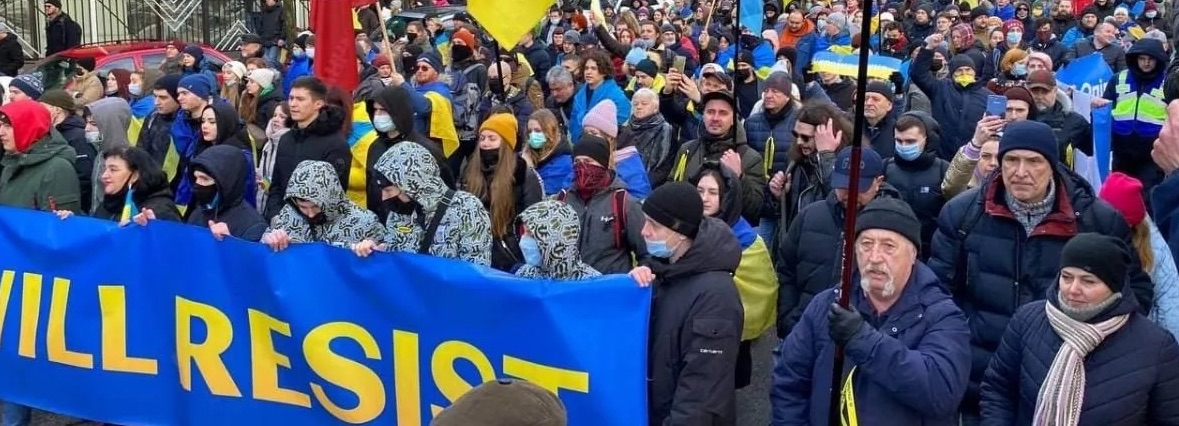Putin’s messianic pretensions as saviour of Russian civilisation have deep religious and historical roots. Yet our western secular world tends to filter out religion and pre-Enlightenment history as irrelevant.
 A protest in Ukraine. / Photo via Jeff Fountain.
A protest in Ukraine. / Photo via Jeff Fountain.
Mr Putin’s messianic pretensions as saviour of Russian civilisation have deep religious and historical roots. Yet our western secular world tends to filter out religion and pre-Enlightenment history as irrelevant.
Hence our surprise at the Hitleresque attack this week, reminiscent of the Nazi occupation of Sudetenland in 1938, or the blitzkrieg on Rotterdam in May 1940, to root out the ‘neo-nazis’ Putin claims to be in control of Ukraine. What irony!
Two historical events, both deeply religious and civilisational, shed light on this week’s violence.
Firstly, the Great Schism in 1054 turned on an argument about the Holy Spirit, when the Catholic and Orthodox Churches excommunicated each other, breaking relations for nine whole centuries! ‘Did the Spirit proceed from the Father, or from the Father and the Son?’ ‘Big deal!’ we think, wondering what the issue really was. Shamefully, it was a power struggle between the eastern and western church leaders which has left a thousand-year legacy of mistrust and misunderstanding. Only at Vatican II did the rift begin to heal.
This split has left a spiritual fault line that became a civilisational boundary between western Catholic/Protestant Europe and eastern Orthodox Eurasia. Starting on the Finnish-Russian border, it snakes down through the heart of Ukraine, bisecting the Balkans through Bosnia. It’s no accident World War I was catalysed on this faultline, as was the Bosnian war. This faultline remains a key factor in the current crisis.
Secondly, when Constantinople fell to the Ottoman Turks in 1453, Ivan the Terrible took on the imperial title of the fallen Eastern Caesars and authority over the traditional Byzantine Empire. From this era onwards, Moscow was seen to be the Third Rome, after the Second Rome, Constantinople. The Moscow Prince assumed the role of supreme ruler of Christian Eastern Orthodox nations and defender of the Christian Eastern Orthodox Church, an autocratic function supposedly determined by God (equivalent to the divine right of kings idea then prevalent in the west).
Putin’s speeches over the years consistently reflect his presumption of the mantel of Moscow Prince to restore the unity of Russian civilisation with Russian ethnicity, language and traditional spirituality. This in contrast, in his view, to the moral laxity of western Christianity and culture with which Ukrainians are ‘dangerously flirting’.
While western sanctions aim to hit Putin’s material welfare, they hardly affect the ‘spiritual fervour’ driving his ambition for which he seems prepared to sacrifice the lives of both fellow Russians and Ukrainians neighbours, whom he inconsistently claims to be the same people.
Neither does he care about international law governing sovereign nations. Back in 1996, the Cold War was over and a new world order seemed almost universally accepted. Some began to declare the ‘end of history’ and the ultimate triumph of western democratic liberalism.
A ‘universal civilisation’ was emerging, sometimes dubbed the Davos culture, shared by the business leaders, politicians, intellectuals, journalists, bankers and government figures who flocked annually to the Swiss Alps to be seen at the World Economic Forum.
Not everyone bought into the Davos culture however. One book warning about the lurking danger of clashes between civilisations was The clash of civilisations and the remaking of world order by Samuel Huntington. It became a much-quoted source of wisdom once the ‘war against Islamic terror’ began. For many, the clash of western ‘Christian’ civilisation with Islamic civilisation had replaced the capitalist-communist clash of the Cold War era.
Yet Huntington’s warning was broader than just about Islam. He foresaw that the dominating source of conflict in the post-cold war world would be cultural, between nations and groups of different civilisations. These included: one, conflicts between dominant states of different civilisations; two, fault-line conflicts between neighbouring states of different civilisations; and three, fault-line conflicts within states among different civilisational groups.
In a brief yet insightful twelve-page section of his global survey, Huntington sketched possible scenarios of Russian-Ukrainian relations (pp. 157-168). While conflict was a possibility, he thought, most likely Ukraine would remain independent, culturally divided yet one nation, cooperating closely with Russia.
So Huntington didn’t get it all right. Yet he was right about civilisational fault lines and that Russia was the heart of a centuries-old civilisational empire. Neutral sovereign nation states do not fit easily into the Russian perspective. Mother Russia has always seen its neighbours as either vassals or enemies.
Ukrainian history has been shaped by repeated brutal repression by its neighbour, its geographical location straddling the millennium-old east-west faultline, as well as by occupation under Poles, Turks and Lithuanians. An excellent place to read this story is Serhii Plokhy’s ‘The gates of Europe’, published after the Crimean invasion. It closes with the observation that war-torn, invaded and humiliated Ukraine has become only more united and determined to maintain her independence.
We are witnessing this right now on our screens.
Jeff Fountain, Director of the Schuman Centre for European Studies. This article was first published on the author's blog, Weekly Word.

Las opiniones vertidas por nuestros colaboradores se realizan a nivel personal, pudiendo coincidir o no con la postura de la dirección de Protestante Digital.
Si quieres comentar o